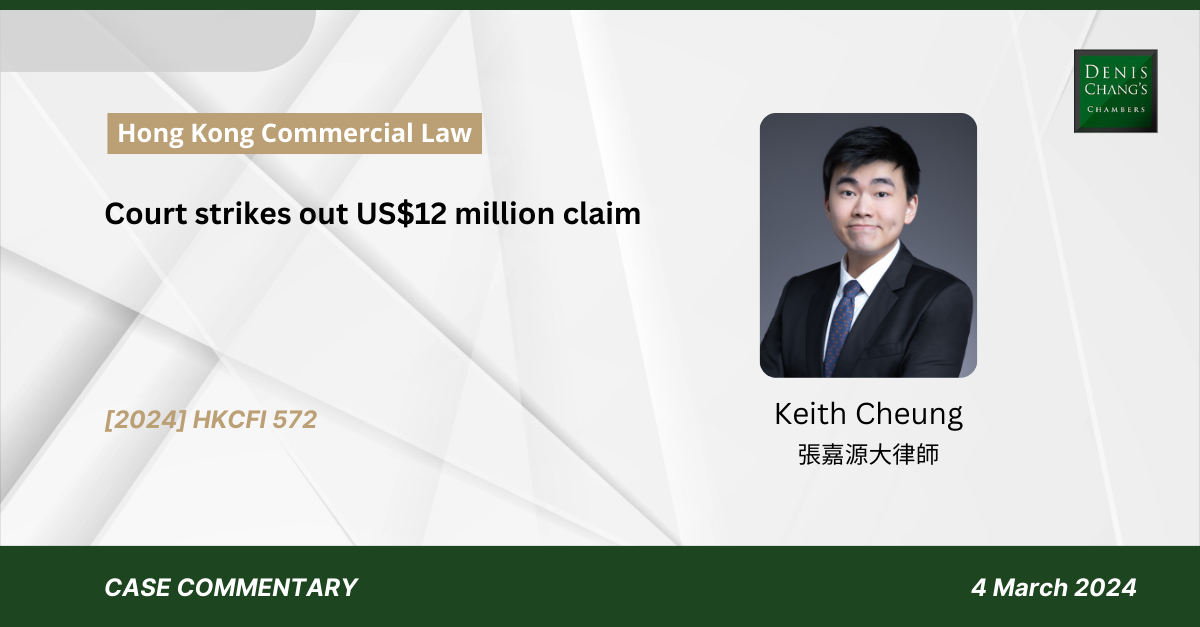
Court strikes out US$12 million claim
Hong Kong Commercial Law
In Remx Limited v LAE Technologies Hong Kong Limited & Ors (HCA 361/2021), the Plaintiff advanced a variety of causes of action including (1) unjust enrichment, (2) constructive / resulting trust, (3) Quistclose trust and (4) dishonest assistance against the 2nd Defendant.
By a decision dated 27 February 2024, the Court struck out the claims and refused the Plaintiff’s late application to vacate the substantive hearing: [2024] HKCFI 572. The decision is a welcome illustration of the Court applying critical scrutiny and striking out claims that are unsustainable and bound to fail.
Keith Cheung, instructed by Messrs Titus, appeared as sole advocate for the successful 2nd Defendant.
Background
In November 2020, the Plaintiff and the 1st Defendant entered into two agreements, namely the CMCA and Distribution Agreement. The Plaintiff claims the latter was a sham intended to facilitate payment pursuant to the CMCA.
On 20 November 2020, the Plaintiff transferred US$12 million to the 1st Defendant (the “Transfer Funds”). The Transfer Funds was paid into an account held by the 2nd Defendant with ANZ bank as the 2nd Defendant is a licensed trustee company holding monies for its clients including the 1st Defendant.
In December 2020, the Plaintiff wanted the return of the Transfer Funds. By an e-mail dated 11 December 2020, the Plaintiff informed the 2nd Defendant that it was terminating its relationship with the 1st Defendant and sought to recall the Transfer Funds. No response was given and the Plaintiff sent further follow up e-mails.
By its Amended Statement of Claim, the Plaintiff demanded the return of the Transfer Funds from the 1st and 2nd Defendants. The 2nd Defendant contended that the Transfer Funds had been spent on purchasing cryptocurrencies which were paid out in accordance with the 1st Defendant’s directions long before it was told by the Plaintiff that it wished to have its monies back.
Strike out application
Preliminary objection
Order 18, rule 19(1) RHC sets out different bases upon which the Court may order strike out. Order 18, rule 19(1)(a) empowers the Court to do so where there is no reasonable cause of action. In an application which solely relies on that ground, evidence is inadmissible.
The Plaintiff raised the novel argument that because the 2nd Defendant relied on Order 18, rule 19(1)(a), it is precluded from relying on the other grounds and, in particular, on its supporting affidavit.
The Court rejected this argument because the summons clearly relied on more than one bases, parties had exchanged affidavits, and the Plaintiff’s written submission acknowledged that strike-out can be founded on the basis that there is no factual basis to a complaint.
Unjust enrichment
The claim of unjust enrichment consists of three elements namely (1) enrichment, (2) at the expense of and (3) unjust factor.
In analysing these three elements, the Court observed:
(1) after a careful examination of the case law, that whether an intermediary who is no more than a mere conduit-pipe for payment to the ultimate recipient may be liable for enrichment is unsettled.
(2) The receipt of Transfer of Funds is sufficient to show the “at the expense of” component.
(3) The Plaintiff has not pleaded any unjust factor and its current plea was demurrable and missed the mark. The Plaintiff complained that the 2nd Defendant received the Transfer Funds in circumstances where the 2nd Defendant provided no consideration. Yet the term “consideration” in the law of unjust enrichment refers to the basis upon which payment was made.[1] Here, even on the Plaintiff’s case, the basis upon which payment of the Transfer Funds was made was the CMCA to which the 2nd Defendant was not party and thus it is questionable whether or not this unjust factor is even available.
Constructive and/or resulting trust
The Plaintiff’s case as pleaded is simply a payment made pursuant to the CMCA which it subsequently wished to terminate. Applying well-established principles, the 1st Defendant did not hold the Transfer Funds for the Plaintiff on trust and it would it is difficult to see how the 2nd Defendant being the more remote party would suddenly become a trustee.
Further, the Court rejected the Plaintiff’s alternative argument that it was a victim of the 1st Defendant’s fraudulent misrepresentation. First, the alternative argument was not pleaded and thus the Plaintiff tacitly accepted that its present claims are not sustainable. Second, the new case is inconsistent with the Plaintiff’s own case: if the Plaintiff intended the Distribution Agreement not to have legal effect, there can be no fraudulent misrepresentation.
Further, the new case fails to clearly identify when it could be said that the 2nd Defendant would have sufficient knowledge of the purported fraud such that its conscience would be affected. The alleged fraud rests on the 1st Defendant disclaiming its previous agreement with the Plaintiff that the Distribution Agreement is only a “device” which is legally ineffective, an agreement to which the Plaintiff was privy.
Quistclose trust
The Transfer Funds was not paid pursuant to an arrangement between the Plaintiff and the 2nd Defendant. That is fatal and defeats the claim in Quistclose trust because the question in every case is whether the parties intended the money to be at the free disposal of the recipient.
Dishonest assistance
There is no clear plea that the 1st Defendant owed fiduciary or trust duties to the Plaintiff or that it had breached such duties where the 2nd Defendant induced or assisted in the alleged breaches with a dishonest state of mind.
In particular, the Court doubted whether any case of dishonesty can be made out even if the 2nd Defendant had not complied in full with its know-your-client or anti-money laundering duties as failing to do so may be equally consistent with honesty or negligence.
Further, insofar as the proprietary base is said to be established by the Plaintiff’s new case based on fraudulent misrepresentation by the 1st Defendant, there is also the issue of the fact that, as at the time of the supposed assistance (i.e., presumably the payment away of the Transfer Funds), rescission had not yet taken place.
Thus, the Court struck out the Amended Statement of Claim as against the 2nd Defendant.
Nevertheless, the Court gave the Plaintiff one last opportunity to re-frame their case and to file a fresh Statement of Claim. However, the Court cautioned the Plaintiff should seriously consider the difficulties set out above and whether or not they could in fact be surmounted.
Late applications
On the eve of the hearing, the Plaintiff made two further applications namely (1) to adduce a further affidavit and (2) to adjourn the substantive hearing.
The first application was to meet the 2nd Defendant’s criticism that the opposing affidavit to strike out was made by a solicitor rather than the client. The Court gave leave because the new affidavit did no more than to confirm and adopt the solicitor’s affidavit.
Although not dealt with in the decision, practitioners should recall the well-known warning that it is not the role of a professional advisor to give evidence on contentious matters in respect of which he may be subject to cross-examination.[2]
The application to adjourn was dismissed because there was no coherent basis put forward to justify an adjournment at the 11th hour.
[1] Shanghai Tongji Science & Technology Industrial Co Ltd v Casil Clearing Limited (2004) 7 HKCFAR 79 at §79.
[2] UES International (HK) Ltd v Maritima Maruba S.A., HCA 632/2011, unrep., 19 November 2013 at §13.
Keith Cheung

Keith is developing a broad civil practice with particular experience and interest in commercial litigation, company law, insolvency, arbitration, trusts, probate and intellectual property. He has represented domestic, Mainland and overseas clients in Hong Kong and worked with legal teams in offshore litigation in the Cayman Islands and the British Virgin Islands.
Keith is a member of the Chartered Institute of Arbitrators and the Hong Kong Institute of Arbitrators.
Prior to joining the Bar, Keith qualified as a solicitor with a major international law firm. He has received awards from international and domestic mooting competitions including the Best Speaker Award from a practitioners’ moot organised by Essex Court Chambers and the Singapore Academy of Law.
Find out more from Keith’s profile.
This article was first published on 4 March 2024.
Disclaimer: This article does not constitute legal advice and seeks to set out the general principles of the law. Detailed advice should therefore be sought from a legal professional relating to the individual merits and facts of a particular case. The photographs which appear in this article are included for decorative purposes only and should not be taken as a depiction of any matter to which the case is related. The views and opinions expressed in this article/material are solely those of the members authoring it and do not necessarily reflect the official policy or position of Denis Chang’s Chambers, or of any other member or members of Denis Chang’s Chambers.